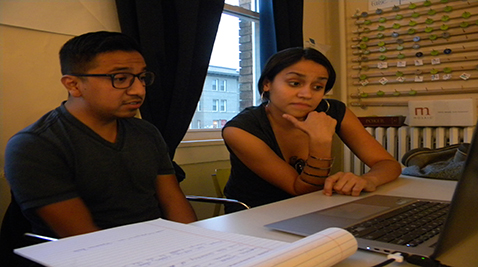WASHINGTON – A group of computer programmers in the Washington area is using coding skills to effect social change, collaborating on public-service projects and teaching women and other underrepresented groups how to code.
Hear Me Code and Code for Progress are two of the organizations that recently collaborated to build Buscando (which means searching), an online database designed to help unaccompanied immigrant children in Maryland find help and resources.
The website is a product of a partnership between volunteer coders and Maryland’s government in response to the needs of unaccompanied immigrant children who have arrived in the state.

For Aliya Rahman, program director at Code for Progress, the task was to provide a digital resource that would serve a specific social group.
“We were asked to think of a way that we could build a tech tool that would fill a gap in public infrastructure,” Rahman said.
Buscando took shape during Tech Lady Hackathon in Washington, a weekend-long gathering for women with all levels of coding experience to collaborate on projects. Forty volunteer coders worked together to build Buscando’s prototype, and the site was launched on September 17.
While Buscando is an example of programmers using their skills to provide a social service, Rahman also sees coding, the process used to build and design websites and other applications, as a tool for activism.
“If the work is to confront power and work with equality and justice in this country, ballots are one way to do it,” Rahman said. “Coding is another way.”
Hear Me Code offers free monthly classes to women who want to learn coding skills. The curriculum, which runs over the course of one year, is designed to equip students with practical skills they can apply in long-term coding projects.
Code for Progress runs a fellowship program which aims to bring new professionals into the technology field. Students attend coding classes full-time, while completing a field project where they design digital tools to help local organizations.
According to Michelle Fox, managing director at Code for Progress, the coding skills that students develop in the fellowship program also make them more appealing to potential employers.
“These sorts of coding skills are the future of organizing, and the future of employment,” Fox said. “Every organization has a need for technology skills.”
Code for Progress and Hear Me Code also aim to increase diversity in the technology industry by offering coding lessons for women and people of color.
According to a 2011 report from the U.S. Census Bureau, nearly three out of every four people working in science, technology, engineering and mathematics fields were men. African-Americans and Hispanics made up a combined 13 percent of the STEM workforce, according to the report.
“It’s hard to look around and see very few people like you,” Rahman said. “It tells you a story, in a way.”
Shannon Turner, founder of Hear Me Code, believes that this disparity is harmful to the industry as a whole.
“The tech industry right now is not using its full talent base,” Turner said. “That’s a big mistake.”
Turner formed Hear Me Code last year after attending technology events where she felt women were underrepresented and not taken seriously.
“If there were 200 people there, I would be one of 10 women,” Turner said. “It was intimidating.”
Turner taught herself to code, and described it as a frustrating and slow experience. Hear Me Code is meant to be an environment where coders can learn from each other.
“I didn’t know anyone who I could reach out to,” Turner said. “In forming this group, I wanted to be that for other people.”


You must be logged in to post a comment.